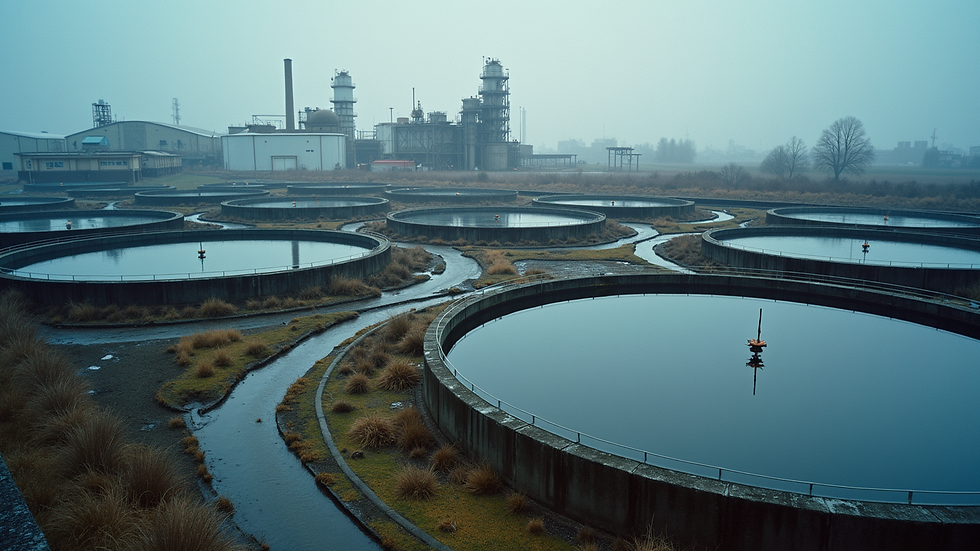Effective Strategies for Industrial Waste Management
- palwinder kaur
- Sep 1, 2025
- 4 min read
Industrial waste management is a critical aspect of sustainable business operations. Industries generate a variety of waste materials, including solid waste, hazardous waste, and wastewater. Proper management of these wastes not only helps in reducing environmental pollution but also ensures compliance with regulations and promotes resource efficiency. This article explores effective strategies for managing industrial waste, providing practical insights and actionable recommendations.
Understanding Industrial Waste Management
Industrial waste management involves the collection, treatment, and disposal of waste produced by industrial activities. The goal is to minimize the negative impact of waste on the environment and human health. Effective management requires a comprehensive approach that includes waste reduction, recycling, treatment, and safe disposal.
Industries can adopt several strategies to manage their waste efficiently:
Waste Minimization: Reducing the amount of waste generated at the source by optimizing processes and using raw materials efficiently.
Segregation: Separating waste types to facilitate recycling and treatment.
Recycling and Reuse: Converting waste materials into new products or using them in other processes.
Treatment: Applying physical, chemical, or biological methods to reduce the toxicity or volume of waste.
Safe Disposal: Ensuring that residual waste is disposed of in a manner that prevents environmental contamination.
Implementing these strategies requires commitment from management, employee training, and investment in appropriate technologies.

Key Components of Industrial Waste Management
Effective industrial waste management depends on several key components that work together to ensure sustainability and compliance:
1. Waste Audit and Characterization
Conducting a waste audit helps identify the types and quantities of waste generated. This information is crucial for designing an effective waste management plan. Characterizing waste involves analyzing its physical, chemical, and biological properties to determine the appropriate treatment and disposal methods.
2. Regulatory Compliance
Industries must comply with local, national, and international regulations governing waste management. This includes obtaining necessary permits, adhering to disposal standards, and reporting waste generation and treatment activities.
3. Employee Training and Awareness
Educating employees about waste management practices ensures proper segregation, handling, and reporting of waste. Training programs should cover safety procedures, environmental impacts, and the importance of waste reduction.
4. Technology and Infrastructure
Investing in modern technologies such as waste treatment plants, recycling facilities, and monitoring systems enhances the efficiency of waste management. Infrastructure should support waste segregation, storage, and transportation.
5. Continuous Monitoring and Improvement
Regular monitoring of waste management processes helps identify areas for improvement. Implementing feedback mechanisms and adopting best practices contribute to ongoing enhancement of waste management systems.

What is the industrial wastewater treatment?
Industrial wastewater treatment is a specialized process designed to remove contaminants from water used in industrial processes before it is released into the environment or reused. This treatment is essential because industrial wastewater often contains harmful chemicals, heavy metals, and organic pollutants that can damage ecosystems and human health.
The treatment process typically involves several stages:
Preliminary Treatment: Removal of large solids and debris through screening and sedimentation.
Primary Treatment: Settling of suspended solids and removal of oils and greases.
Secondary Treatment: Biological treatment using microorganisms to degrade organic pollutants.
Tertiary Treatment: Advanced processes such as filtration, chemical treatment, and disinfection to remove remaining contaminants.
Industries may also implement water recycling systems to reduce freshwater consumption and minimize wastewater discharge.
For more detailed information on industrial wastewater management, specialized resources and service providers can offer tailored solutions.

Practical Strategies for Reducing Industrial Waste
Reducing industrial waste is the first step toward effective waste management. Here are some practical strategies industries can adopt:
Process Optimization
Streamline manufacturing processes to minimize raw material waste.
Implement lean manufacturing principles to reduce excess inventory and defects.
Use automation and control systems to improve precision and reduce errors.
Material Substitution
Replace hazardous materials with safer alternatives.
Use recyclable or biodegradable materials where possible.
Waste Segregation and Recycling
Separate waste streams at the source to facilitate recycling.
Partner with recycling companies to process recyclable materials.
Implement on-site recycling programs for materials like metal, paper, and plastics.
Employee Engagement
Encourage employees to participate in waste reduction initiatives.
Provide incentives for innovative ideas that reduce waste.
Regular Maintenance
Maintain equipment to prevent leaks and spills.
Monitor process efficiency to detect and address waste generation issues promptly.
Benefits of Effective Industrial Waste Management
Implementing effective waste management strategies offers numerous benefits:
Environmental Protection: Reduces pollution and conserves natural resources.
Cost Savings: Lowers disposal costs and can generate revenue through recycling.
Regulatory Compliance: Avoids fines and legal issues.
Improved Corporate Image: Demonstrates commitment to sustainability, attracting customers and investors.
Health and Safety: Minimizes risks to workers and surrounding communities.
By adopting a proactive approach, industries can turn waste management challenges into opportunities for innovation and growth.
Future Trends in Industrial Waste Management
The field of industrial waste management is evolving with advancements in technology and increasing environmental awareness. Some emerging trends include:
Circular Economy Models: Designing products and processes to keep materials in use for as long as possible.
Digital Monitoring: Using sensors and data analytics to optimize waste management operations.
Green Chemistry: Developing processes that reduce or eliminate hazardous substances.
Energy Recovery: Converting waste into energy through processes like anaerobic digestion and incineration.
Collaborative Platforms: Sharing resources and knowledge among industries to improve waste management efficiency.
Staying informed about these trends can help industries remain competitive and environmentally responsible.
Taking the Next Step in Waste Management
Effective industrial waste management requires a strategic approach that integrates technology, regulation, and human factors. Industries should start by assessing their current waste generation and management practices. From there, they can develop a comprehensive plan that includes waste reduction, treatment, and disposal.
Partnering with experts and leveraging innovative solutions can enhance the effectiveness of waste management programs. Continuous improvement and adaptation to new technologies and regulations will ensure long-term sustainability.
By prioritizing waste management, industries contribute to a cleaner environment, safer communities, and a more sustainable future.



Comments